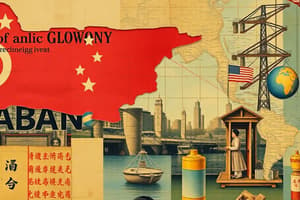Podcast
Questions and Answers
Who is regarded as the founder of the classical school?
Who is regarded as the founder of the classical school?
- Adam Smith (correct)
- T.R.Malthus
- David Ricardo
- J.S.Mill
Which theory is related to Mahatma Gandhi's economic thought?
Which theory is related to Mahatma Gandhi's economic thought?
- None of these
- Bread Labour (correct)
- Marginal Utility
- Both Bread Labour and Marginal Utility
Who established the first Cambridge School of Economics in 1903?
Who established the first Cambridge School of Economics in 1903?
- Pigou
- Hicks
- Keynes
- Marshall (correct)
The Ricardian theory of comparative advantage relates to which outcome?
The Ricardian theory of comparative advantage relates to which outcome?
Who gave the wage fund theory?
Who gave the wage fund theory?
Who gave the slogan 'Back to the villages'?
Who gave the slogan 'Back to the villages'?
From the following, which economist is not related to physiocracy?
From the following, which economist is not related to physiocracy?
Mercantilists objected to which of the following?
Mercantilists objected to which of the following?
Who wrote the book 'Economic History of India'?
Who wrote the book 'Economic History of India'?
Which economist is known for developing the idea of specialization of labour?
Which economist is known for developing the idea of specialization of labour?
Who is recognized as the father of scientific socialism?
Who is recognized as the father of scientific socialism?
What is the meaning of the term 'Oikonomia'?
What is the meaning of the term 'Oikonomia'?
In which year was the book 'Wealth of Nations' published?
In which year was the book 'Wealth of Nations' published?
Which international trade theory is associated with J.S. Mill?
Which international trade theory is associated with J.S. Mill?
Which economist is famous for his population theory?
Which economist is famous for his population theory?
Which statement reflects the belief of Mercantilism?
Which statement reflects the belief of Mercantilism?
Who is the author of the book 'Das Capital'?
Who is the author of the book 'Das Capital'?
What principle is associated with J.S.Mill?
What principle is associated with J.S.Mill?
Which economist is linked to the Austrian School?
Which economist is linked to the Austrian School?
What is the main idea of Friedrich List's advocacy?
What is the main idea of Friedrich List's advocacy?
Who is known for emphasizing the time element in the theory of value?
Who is known for emphasizing the time element in the theory of value?
What concept does 'want satisfying capacity of a commodity' refer to?
What concept does 'want satisfying capacity of a commodity' refer to?
Who is recognized as the father of economics?
Who is recognized as the father of economics?
Which Roman writer authored 'Natural History'?
Which Roman writer authored 'Natural History'?
Who wrote the book 'Arthashastra'?
Who wrote the book 'Arthashastra'?
Which economist proposed the wage theory of profit?
Which economist proposed the wage theory of profit?
In Malthusian population theory, how does the population increase?
In Malthusian population theory, how does the population increase?
When was the 'general theory of employment interest and money' published?
When was the 'general theory of employment interest and money' published?
Which law is also known as Gossen's first law?
Which law is also known as Gossen's first law?
Who was the profounder of the natural rate of interest?
Who was the profounder of the natural rate of interest?
What is the meaning of the term 'Laissez Faire'?
What is the meaning of the term 'Laissez Faire'?
Who put forward the Drain theory of wealth?
Who put forward the Drain theory of wealth?
Which economist is known for the Welfare definition of economics?
Which economist is known for the Welfare definition of economics?
The famous Diamond-Water paradox is associated with which economist?
The famous Diamond-Water paradox is associated with which economist?
Which definition of economics focuses on the alternative use of resources?
Which definition of economics focuses on the alternative use of resources?
Who is known as the father of modern Indian economics?
Who is known as the father of modern Indian economics?
The concept of the Industrial Reserve Army was introduced by whom?
The concept of the Industrial Reserve Army was introduced by whom?
Flashcards are hidden until you start studying
Study Notes
History of Economic Thought
- Adam Smith is credited as the founder of the Classical School of Economic thought.
- Alfred Marshall established the Cambridge School of Economics in 1903.
- Mahatma Gandhi advocated for a return to village life and self-sufficiency.
- Classical economists believed that doubling the quantity of money would lead to a doubling of prices.
- J.K. Mehta defined economics as the study of how people satisfy their unlimited wants with scarce resources.
- Mahatma Gandhi's economic thought was based on the principles of Bread Labour and Marginal Utility.
- Physiocracy is a school of thought associated with Richard Cantillon, Robert Turgot, and Francis Quesnay.
- Mahatma Gandhi advocated for the principle of 'Ahimsa' (nonviolence).
- Mercantilists opposed free trade, advocating for policies that increased exports and decreased imports.
- David Ricardo's theory of comparative advantage explained the benefits of international trade based on specialization.
- Thomas Robert Malthus wrote the book "Essay on the Principle of Population," which explored the relationship between population growth and resource scarcity.
- Antonio Serra was associated with the Mercantilist School of thought.
- J.S.Mill proposed the wage fund theory, stating that wages are determined by the amount of capital available to pay workers..
- Karl Marx argued that socialism arises from class conflict between the proletariat (workers) and the bourgeoisie (capitalists).
- Ramesh Chandra Dutta wrote "The Economic History of India."
- Adam Smith developed the concept of specialization of labor, highlighting its efficiency benefits.
- Karl Marx is considered the father of scientific socialism.
- Leon Walras is associated with the Mathematical School of economics.
- Bohm Bawerk is associated with the Austrian School of Economics.
- Thorstein Veblen is associated with the Institutional School of economics.
- Robert Owen is associated with the Associative School of economics.
- Thomas Robert Malthus is known for his population theory.
- Marx argued that capital accumulation is driven by surplus labor.
- Adam Smith's "Wealth of Nations" was published in 1776.
- Mercantilists believed that gold and silver were the primary measures of a nation's wealth.
- The correct order of economic systems is Feudalism, Mercantilism, Capitalism, and Imperialism.
- The correct order of events is Gold Standard Mechanism, Great Depression, Globalization, and Global Financial Crisis.
- Alfred Marshall wrote "The Principles of Economics."
- J.S.Mill proposed the theory of reciprocal demand as an explanation for international trade.
- Adam Smith based his theory of international trade on the concept of labor prices.
- Wicksell is credited with developing the concept of the natural rate of interest.
- Dada Bhai Naoroji put forward the Drain Theory of Wealth, arguing that British colonialism depleted India's resources.
- Laissez Faire refers to a free market economy with minimal government intervention.
- Quesnay was a member of the Physiocrats, believing that land was the source of all wealth.
- The Scarcity Definition of economics emphasizes the allocation of scarce resources to meet unlimited wants.
- Consumer Surplus represents the difference between the maximum price a consumer is willing to pay for a good and the actual price they pay.
- Jacob Viner coined the phrase "Economics is what economists do."
- Dada Bhai Naoroji wrote the book "Poverty and Un-British Rule in India."
- Alfred Marshall provided the welfare definition of economics.
- Friedrich List, Adam Muller, and Wilhelm Roscher are associated with the Nationalist approach to economics.
- Leon Walras developed the general equilibrium model.
- The Diamond-Water Paradox is related to the distinction between value in use and value in exchange.
- Karl Marx introduced the concept of the Industrial Reserve Army, referring to the pool of unemployed workers.
- M.G. Ranade is considered the father of modern Indian economics.
- Utility refers to the satisfaction or benefit a consumer derives from consuming a good or service.
- Francis Quesnay is associated with the "Tableau Economique," a model of the circular flow of income.
- Gustav Cassel is known for his work on purchasing power parity theory.
- J.B. Say famously stated, "Supply creates its own demand."
- Karl Marx wrote "Das Capital."
- Karl Menger was a prominent member of the Austrian School of Economics.
- Friedrich List advocated for protectionist policies, particularly for infant industries.
- Alfred Marshall is credited with the concept of the equilibrium firm.
- Alfred Marshall emphasized the importance of the time element in the theory of value.
- Classical economists considered land and labor as primary factors of production.
- Robert Owen is known for his experimental socialist communities.
- Dada Bhai Naoroji was the first Indian to estimate the country's national income.
- Mahatma Gandhi advocated for the development of cottage industries in India.
- Irving Fisher's Quantity Theory of Money is represented by the equation PT = MV + M'V'.
- Adam Smith is considered the father of economics.
- Pliny is known for his book "Natural History."
- Ricardo argued that rent is not a part of production costs but rather a surplus.
- Classical economists linked the demand for money to both its use in storing value and its role in exchange.
- W. Stanley Jevons wrote the book "The Theory of Political Economy."
- John Maynard Keynes' "General Theory of Employment, Interest, and Money" was published in 1936.
- Malthus stated that population grows in a geometric progression while subsistence resources grow at an arithmetic rate.
- Adam Smith advocated for free trade in his theories.
- Robert Turgot was a prominent member of the Physiocrats.
- Amartya Sen received the Nobel Prize in Economics in 1998.
- Gossen's First Law is also known as the Law of Diminishing Marginal Utility.
- Kautilya wrote the book "Arthashastra."
- J.B. Clark is known for his wage theory of profit.
- J.M. Keynes was the first economist to highlight the importance of effective demand in determining economic activity.
Studying That Suits You
Use AI to generate personalized quizzes and flashcards to suit your learning preferences.




